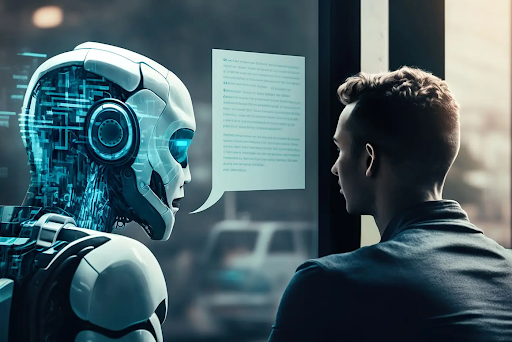AI and Tech are changing the game for CEOs. They are not just tools, but partners in decision-making. They can crunch numbers, generate insights, and offer solutions faster and better than ever before. But they also bring new challenges and ethical dilemmas.
However, AI and Tech also pose some challenges and risks for CEO decision-making, such as data security, privacy, ethics, accountability, workforce impact, skills gap, and talent management. Now, you might be thinking, how to tackle them, right?
Don’t worry, we’ve brought this guide to help you solve these problems.
In this guide, we’ll share expert insights on how AI and Tech impact CEO decision-making — helping you understand the challenges they pose and offering solutions to navigate them.
Explore.
Balancing Data and Vision
“AI and tech are giving CEOs access to unprecedented amounts of data and analytics, which can help them make smarter and faster decisions. However, data and analytics are not enough. CEOs also need to have a clear vision, a strong strategy, and a deep understanding of their customers and markets. They also need to know how to ask the right questions, interpret the results, and communicate the insights effectively,” says Saba Mobebpour, CEO at SPOCKET.
CEOs have a lot on their plate. They need to balance data-driven insights with visionary leadership to make effective decisions. With the help of technology, they can access real-time data and analytics that can inform their strategic direction.
Remember that technology is only one piece of the puzzle. Human intuition and foresight are also essential for interpreting complex scenarios, fostering innovation, and steering the organization towards a future where data and vision coexist.
By striking a balance between technology and human intuition, CEOs can harness the full potential of AI and tech while preserving the visionary essence that drives meaningful and forward-thinking decisions. This symbiotic relationship can help create a work environment that is welcoming to all and fosters creativity and growth.
Fostering Creativity
“AI and tech have opened up new avenues for CEOs to make more creative and innovative decisions. They can now explore new possibilities, expand their horizons, and stimulate their imagination. However, creativity and innovation are not just about technology. They are also about people, culture, and leadership. To foster a climate of experimentation, collaboration, and learning within their organizations, CEOs need to empower their teams to generate and implement new ideas,” adds Travis Kliever, Global Business Development Advisor at RemotePad.
CEOs are increasingly relying on AI and technology to make data-driven decisions. However, it’s important to remember that innovation often comes from human creativity and imagination. By fostering a culture of creativity, leaders can harness the collective intelligence of their teams and promote a synergy between human innovation and technological capabilities.
To encourage creativity in the workplace, CEOs should focus on creating a stimulating atmosphere that encourages imaginative thinking. This can be achieved by providing employees with a diverse group of colleagues, a wide-open whiteboard to work with, and a relaxed setting for brainstorming. It’s also important to recognize and reward employees for their contributions, and to encourage individuality and unique perspectives.
Cultivating Trust and Ethics
“CEOs today leverage AI and technology to foster greater transparency, accountability, and feedback in their decision-making processes, ultimately enhancing trust and ethical practices within their organizations. However, trust and ethics are not just about technology. They are also about values, principles, and purpose. CEOs need to ensure that their decisions are aligned with their core values, and that they are serving the best interests of their stakeholders, including their customers, employees, partners, and society,” says Eran Mizrahi, CEO of Ingredient Brothers.
As AI and technology continue to shape the business world, it’s important for CEOs to prioritize transparency and ethical considerations. By ensuring that AI algorithms are fair, unbiased, and aligned with ethical standards, leaders can build trust among stakeholders. Communicating openly about the ethical framework guiding decision-making processes is also crucial in fostering trust.
To cultivate a culture of integrity and ethical awareness, CEOs should focus on creating an environment that encourages open communication and transparency. This can be achieved by providing employees with the tools and resources they need to make informed decisions, and by promoting a culture of collaboration and teamwork. By doing so, CEOs can enhance their leadership credibility and navigate the evolving landscape of technology with a commitment to responsible and trustworthy decision-making.
Championing Diversity and Inclusion
“CEOs are empowered by AI and tech to cultivate diversity and inclusivity, immersing themselves in varied perspectives, experiences, and cultures. But CEOs need to attract and retain diverse talent, and create a culture of belonging and respect within their organizations. They also need to lead by example, and embrace diversity and inclusion as a source of strength and innovation,” says Martin Seeley, CEO of Mattress Next Day.
CEOs who embrace diversity and inclusion in their decision-making processes are more likely to succeed. By promoting an inclusive environment, CEOs can leverage the transformative potential of diverse perspectives. AI can help mitigate biases in decision-making processes, ensuring fair and equitable outcomes.
Embracing diversity fosters a culture of innovation where varied experiences and insights contribute to well-rounded decision-making. By championing diversity and inclusion, CEOs not only enhance organizational resilience but also position their companies to navigate the complexities of the digital era with a richer tapestry of ideas.
Navigating Complexity
“AI and tech are transforming CEOs to make more complex and uncertain decisions, by increasing the speed, scale, and scope of their challenges and opportunities. However, complexity and uncertainty are not just about technology. They are also about mindset, culture, and leadership. CEOs need to adopt a growth mindset, and be willing to learn, adapt, and evolve,” explains Casey Meraz, Founder & CEO of Juris Digital.
AI and technology are transforming the business landscape, and CEOs face the challenge of navigating complexity in decision-making. The integration of advanced technologies often introduces intricate systems and data sets, requiring leaders to adeptly maneuver through uncertainties.
CEOs must embrace a holistic understanding of complex algorithms and technological frameworks while considering the broader organizational context. Navigating complexity involves synthesizing multifaceted information to make informed decisions. The ability to decipher intricate relationships between various factors, both technological and organizational, is pivotal.
By developing strategies to streamline complexity and harness the benefits of technology effectively, CEOs can ensure resilient decision-making in the face of evolving challenges and opportunities within the digital landscape.
The Transformative Impact of AI on Decision-Making
“The integration of AI has fundamentally altered the CEO decision-making landscape, offering unparalleled accuracy and efficiency. With enhanced data analytics capabilities, leaders can now make informed choices at the speed of business, driving strategic success in real-time,” says Lara Jansen, Marketing Expert at Paedatric First Aid Courses.
AI is transforming how leaders navigate business landscapes. It augments traditional decision-making processes with data-driven insights and predictive analytics.
CEOs now use advanced algorithms to analyze vast datasets, enabling more informed and strategic choices. AI’s ability to process information at unprecedented speeds enhances decision accuracy and efficiency.
Predictive algorithms empower leaders to anticipate market trends and make proactive decisions. However, this transformation isn’t without challenges, as ethical considerations, potential biases, and the need for a harmonious balance between human intuition and machine-driven analytics come into play.
Understanding and harnessing the transformative power of AI is central to the evolution of decision-making, propelling organizations into a future where technology and human intelligence synergize for optimal outcomes.
Ethical Considerations in AI-Driven Decision-Making
“As we embrace technology in decision-making, ethical considerations become paramount. The power of AI must be wielded responsibly to avoid biases and ensure fair outcomes, emphasizing the need for a harmonious blend of human wisdom and machine intelligence,” says Jonathan Rosenfeld, Founder & Attorney at Rosenfeld Injury Lawyers LLC.
AI algorithms are increasingly influencing decision-making processes, and this raises concerns about fairness, transparency, and accountability. CEOs must grapple with questions of privacy, consent, and the societal impact of their AI-powered decisions.
To ensure ethical standards are upheld, CEOs must strike a balance between innovation and responsible AI usage. Addressing these ethical considerations becomes a critical aspect of effective leadership, promoting trust among stakeholders and demonstrating a commitment to responsible, socially conscious decision-making in the rapidly advancing landscape of AI technology.
Strategic Partnership: CEOs and AI in the Digital Age
“Successful CEOs leverage AI not just as a tool but as a strategic partner. Predictive analytics and scenario planning empower leaders to navigate uncertainties, staying ahead of market trends and fostering agile, future-ready organizations,” shares Ritika Asrani, Owner and Broker of Century21 St Maarten Real Estate.
AI is a powerful partner for CEOs. It helps them make smarter and faster decisions by providing intelligent insights. This partnership is strategic because it helps businesses plan and make choices in a clever way.
CEOs use AI to understand what’s happening in the business world, predict future trends, and make better decisions. It’s like having a teammate that’s really good with data and can help the CEO steer the company in the right direction. Together, CEOs and AI make a strong team, making sure companies stay competitive and smart in our digital world.
Balancing Data Insights with Visionary Leadership
AI and tech are giving CEOs access to unprecedented amounts of data and analytics, which can help them make smarter and faster decisions. However, data and analytics are not enough. CEOs also need to have a clear vision, a strong strategy, and a deep understanding of their customers and markets. Also, they need to know how to ask the right questions, interpret the results, and communicate the insights effectively.
Balancing data insights with visionary leadership underscores the delicate equilibrium CEOs must strike in the era of AI-driven decision-making. While data provides valuable insights, visionary leadership remains indispensable for steering the organization towards long-term success. This concept involves leveraging the analytical power of data to inform strategic decisions, without compromising the intuitive and forward-thinking qualities of human leadership.
Effective CEOs recognize the symbiotic relationship between data-driven precision and visionary foresight, ensuring that technology serves as a tool to enhance, rather than replace, the strategic acumen of leaders. By harmonizing data-driven insights with visionary decision-making, CEOs can navigate complexities, foster innovation, and propel their organizations into a future where both analytical rigor and creative vision coalesce for sustained success.
Navigating Trust and Accountability
AI and tech are enhancing CEOs to make more trustful and ethical decisions, by providing them with more transparency, accountability, and feedback. CEOs need to ensure that their decisions are aligned with their core values, and that they are serving the best interests of their stakeholders, including their customers, employees, partners, and society.
AI is becoming more prevalent in decision-making, and CEOs must ensure that stakeholders trust the technology. To build trust, CEOs should be transparent about how AI algorithms work and the ethical principles guiding their use.
CEOs must also take responsibility for the outcomes of AI-driven decisions, acknowledging the potential risks and mitigating biases. Striking the right balance involves establishing a foundation of trust with employees, customers, and the broader community, while also taking responsibility for the ethical implications of AI applications.
Conclusion
AI and tech are reshaping the way CEOs make decisions, by providing them with new data, insights, and solutions that can enhance their performance, innovation, and strategy. However, AI and tech also pose some challenges and risks for CEO decision-making, such as data security, privacy, accuracy, workforce impact, and talent management. Therefore, CEOs need to balance the opportunities and risks of AI and tech, and ensure that they use them in a responsible and ethical manner.
Plus, they also need to adopt a mindset and culture of learning, growth, agility, and resilience, and engage and empower their workforce with AI and tech tools and training. By doing so, CEOs can leverage the full potential of AI and tech for their decision-making, and lead their organizations to the next level of performance and growth.












